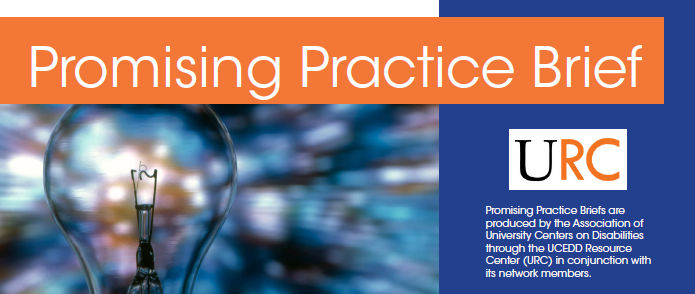|

Promising Practice Briefs are intended to highlight projects of excellence with a goal of offering a program model from which University Centers for Excellence in Developmental Disabilities (UCEDDs) can glean inspiration for new activities and promising practices to augment their own work. A promising UCEDD practice may be a research or evaluation project, policy analysis, data assessment, outreach initiative, or awareness effort. It may provide a direct service or a supported opportunity to people with a developmental disability, indirect support to family and community caregivers, or interdisciplinary training for students, fellows, professionals, and policymakers. It may involve leadership development, community work, or clinical practice.
- Trainee Voices: Increasing and Supporting Trainee Diversity
In recent years, the AUCD network has focused on identifying and deploying efforts and strategies to successfully achieve more diverse and inclusive interdisciplinary training programs. To better evaluate current strategies and further understand how to successfully support trainee diversity, AUCD staff solicited information and insight from a variety of trainees from different generations, backgrounds, and cultures who have completed UCEDD or LEND training programs across the country.
- A UCEDD's Focus on Supporting a Diverse Community of Trainees (NJ UCEDD)
The Boggs Center Interdisciplinary Traineeship offers a comprehensive introduction to the field of developmental disabilities and provides the opportunity for student trainees to work with professionals of various disciplines, as well as people with disabilities, families, and community members of different cultures and backgrounds. In addition to designing a culturally competent and responsive traineeship, The Boggs Center is mindful and intentional with the strategies that they use for recruiting and sustaining trainees to ensure that their program reaches and supports individuals from diverse backgrounds.
- Consumer Advisory Committee (CAC) Support
NDCPD engages in several activities to support its CAC members, including conducting a well-defined orientation; providing a CAC member handbook; training CAC members on the purpose, logistics, and function of boards, committees, and advisory councils; and training CAC members on identifying and obtaining the necessary support to participate in a board,committee, or advisory council. Two additional activities engaged in by NDCPD to support their CAC members include job shadowing, and opportunities to provide feedback on NDCPD funding opportunities.
- Children's Freedom Initiative (Georgia IHDD UCEDD)
Collaboration among DD Network partners and self-advocacy groups in locating the children under age 22 who were institutionalized in hospitals, nursing homes, and other private facilities in the State;proposing legislation to the State Assembly requesting State agencies work together to transition every institutionalized child to a family home;overseeing transition planning; sharing the personal stories of institutionalized children and their families; securing State Medicaid match waiver funding for all institutionalized children; and undertaking longitudinal research studies to document the lives of institutionalized children before and after their move into family life.
- Pueblo Connections (New Mexico UCEDD)
A comprehensive array of culturally appropriate services and supports for families who have a son or daughter with a disability in one of four pueblos.
s
|








